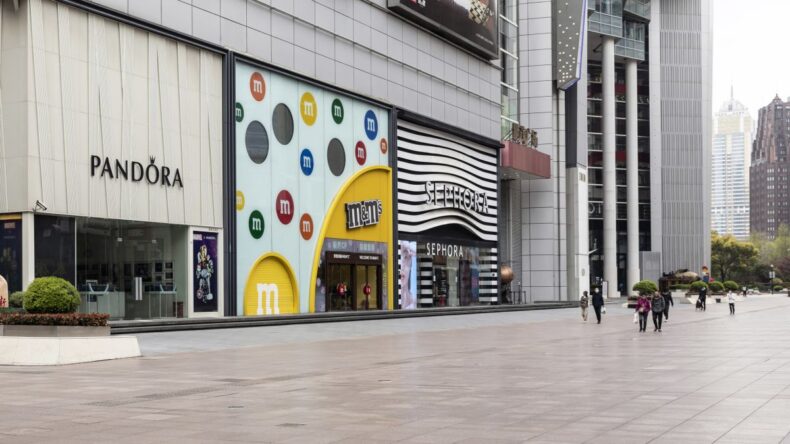International companies are disclosing the financial impact of China’s “zero Covid” policy.
This decision has kept tens of millions of people locked up and affected practically every primary industry.
Hundreds of mainland Chinese towns, including the financial centre of Shanghai, have been closed in recent weeks as officials attempt to eradicate the coronavirus.
That disrupts supply and demand in businesses ranging from Big Tech to consumer products and gives bosses another significant issue.
Many corporations had just incurred millions, if not billions, of dollars in damages due to the Ukraine conflict, which had resulted in a significant — and costly — corporate departure from Russia.
The two incidents have resulted in a devastating one-two punch for global firms like Estée Lauder (EL). Last week, the “two substantial headwinds” prompted it to reduce its expectations for the year.
The crisis is a harsh reminder of China’s disproportionate importance to global corporations.
“Like it or not, if you’re a multinational, China is certainly your first or second-largest consumer market at this moment,” said Ben Cavender, managing director of China Market Research Group.
“And it’s presumably your main manufacturing base, or it’s in charge of a large portion of your supply chain operations,” he said in Shanghai.
Tens of millions of people have been kept at home for more than a month due to the restrictions, resulting in severe levels of emotional stress.
Residents are frequently unable to leave their residences without specific permission from community leaders, and many businesses remain closed.

No desire to shop
China has recently become the largest market for various sectors, from luxury items to vehicles. However, the world’s second-largest economy slowed considerably last month, affecting consumer spending and jobs.
Estée Lauder, the parent company of Bobbi Brown and MAC cosmetics, now anticipates worldwide sales to rise between 7% and 9% year on year, down from a previously stated range of 13% to 16% in February.
Following the invasion, the company stated it took a hit by stopping all operations in Russia and Ukraine, resulting in a drop in revenue.
According to Chief Financial Officer Tracey Travis, sales in the Asia Pacific declined 4% in the fourth quarter, “driven completely by Greater China,” according to Chief Financial Officer Tracey Travis during an earnings call.
Adidas announces a roughly 40% reduction in profitability. Here’s why Adidas reported an almost 40% reduction in profits. Here’s why some companies have refused to provide any forecasts at all.
Last week, Starbucks (SBUX) said that financial guidance would be discontinued for the next six months, citing “the most appropriate course of action” by CEO Howard Schultz.
“The situation in China is unparalleled,” he said during an earnings conference with analysts. “We have almost no capacity to forecast our performance in China in the second half of the year due to China’s current conditions.” Starbucks’ second largest market is in the country.
Kering, the parent company of Gucci and Bottega Veneta, claimed last month that the lockdowns were causing “severe decreases in traffic,” store closures, and substantial logistical issues.
On a corporate sales call, Chief Financial Officer Jean-Marc Duplaix stated, “The issue is hopefully transitory.”
China’s condition is unparalleled.
For example, in Shanghai, the lockout caused a big food rush and numerous complaints about delivery delays.
Even as connectivity increases, many individuals focus on “group shopping,” which allows users in the same town to place large orders for food and other necessities.
Even individuals who are not confined to their homes may be impacted.
According to Cavender, consumers in locations with no limitations may be hesitant to travel to the mall for fear of “what occurred in Shanghai,” where people are kept in lockdown forever.
“It’s had a significant detrimental impact on consumption.”
China’s still the world’s factory
Companies are also having difficulties on the back end.
Because of the trade conflict with the United States, several corporations have attempted to relocate at least some of their manufacturing outside China in recent years.
However, many household names have been caught up in the Covid crackdown.
Last month, Apple (AAPL) warned of massive losses due to the Covid-19 outbreak in China, estimating that supply chain concerns might cost the company up to $8 billion in revenue this quarter.
Apple attributed the predicted revenue loss to China’s restrictions and global component shortages.
According to Everstream Analytics, a business that provides supply chain risk monitoring, some shutdowns temporarily affected around 20% to 30% of all iPhone manufacturing.
In an earnings call, Apple CEO Tim Cook claimed that the company’s constraints were “mainly centred around the Shanghai corridor,” where numerous manufacturing were impacted.
In certain circumstances, the strain has reached a boiling point. Videos on social media showed workers storming over barriers and arguing with security personnel in hazardous suits, implying that tensions had risen after weeks of lockdowns. The cause of the occurrence was not immediately apparent.
Volkswagen (VLKAF) and Toyota (TM), two of the world’s largest automakers, were recently forced to halt production temporarily.
While both firms have subsequently begun manufacturing, they have cautioned that while supply chain issues persist, they will only be able to ramp up gradually.
Tesla (TSLA), a Gigafactory in Shanghai, also managed to restart production last month following a several-week stoppage.
Still, the business may have encountered another problem.
According to Reuters, Tesla production has been suspended due to supplier concerns, citing unnamed sources.
Many brands have expressed confidence that their companies would rebound once the crisis has passed.
In recent weeks, the China’s government has been working hard to get more firms up and running while also promising to assist the economic harm.
Read More : Miners working with Bitcoins Despite Ban on Crypto in China













